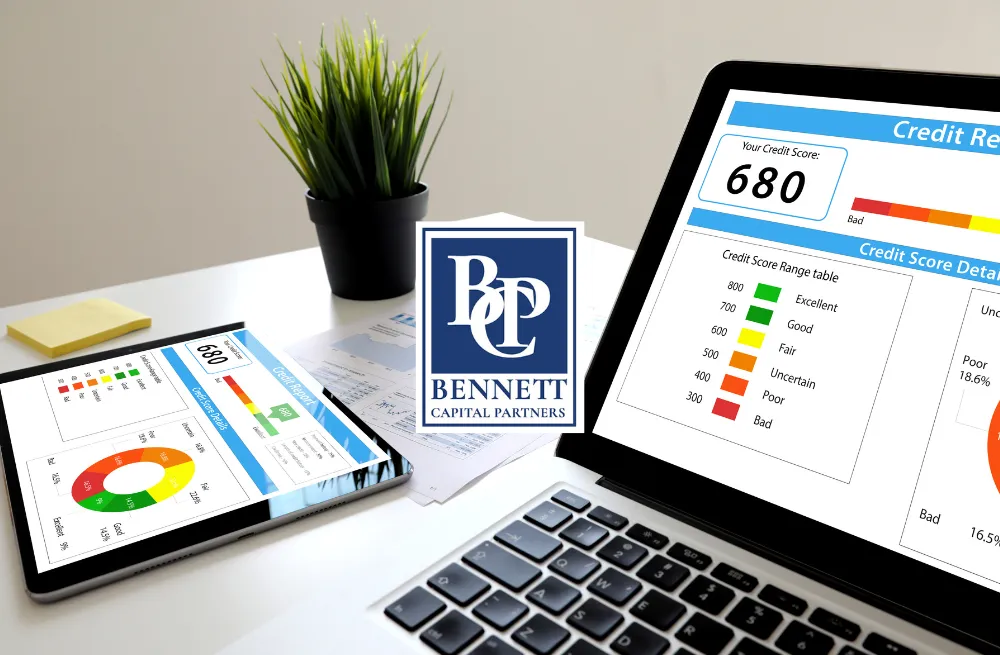Guide to Qualifying for a Mortgage: Unlock Your Dream Home
Updated: Apr 20

Buying a home is an exciting milestone, but it can also be a daunting process. Before you start house-hunting, it's essential to know if you'll qualify for a mortgage. In this guide, we'll walk you through the steps to determine your mortgage qualification, including understanding your credit score, assessing your debt-to-income ratio, exploring mortgage loan types, and securing a pre-approval. Let's get started!
Quick Navigation - Click the link below to jump to that section..
Assessing Your Credit Score

Your credit score is a critical factor in determining your mortgage eligibility. Lenders use this number to gauge your creditworthiness and likelihood of repaying the loan.
✔ Check your credit score: Obtain a free credit report from one of the major credit bureaus (Experian, TransUnion, or Equifax) and review your score. A higher score increases your chances of qualifying for a mortgage. You can check your credit score on your own or contact us, and we can help you check your official tri-merge mortgage credit report.
✔ Improve your credit score: Pay off any outstanding debts, make timely payments, and avoid applying for new credit lines to boost your score. To learn more about credit scores and how to improve them, you can read our blog posts:
Understanding Your Debt-to-Income Ratio And Qualifying for a mortgage

Your debt-to-income (DTI) ratio is another crucial aspect of your mortgage qualification. Lenders use this ratio to measure your ability to manage monthly payments. A lower DTI ratio is preferable, as it demonstrates that you have a manageable debt load relative to your income.
✔ Calculate your DTI ratio: Divide your total monthly debt payments by your gross monthly income to find your DTI ratio. You can use online DTI calculators to help with this calculation. The lower the percentage, the better your chances of qualifying for a mortgage. Generally, lenders prefer a DTI ratio of 43% or lower, but specific requirements may vary. For an easy to use mortgage amortization calculator visit our blog post Use Bennett Capital Partners Amortization Loan Calculator Schedule Tool
Talk to one of our brokers today to discuss 305-407-0747
✔ Lower your DTI ratio: Pay down debts and avoid taking on new loans to improve your ratio and increase your chances of mortgage qualification. Strategies to reduce your DTI ratio include paying off high-interest credit card balances, consolidating loans, and increasing your income. You can find additional tips on lowering your DTI ratio from resources like Bankrate and Investopedia.
Exploring Mortgage Loan Types

Different mortgage loan types cater to various financial situations. Researching the available options can help you find the most suitable mortgage for your needs.
Exploring Mortgage Loan Types
Different mortgage loan types cater to various financial situations. Researching the available options can help you find the most suitable mortgage for your needs.
➡️ Conventional mortgages: These loans require a minimum down payment of 3-5% and typically have more stringent credit requirements. Primary, Second Homes and Investment Properties. To learn more read out bllog post here
➡️ Government-backed mortgages: FHA, VA, and USDA loans are backed by the federal government and typically offer lower down payment requirements and more lenient credit standards.
➡️ Non-QM mortgages: Non-Qualified Mortgages are designed for borrowers who may not meet the standard requirements for conventional or government-backed loans.
➡️ Foreign National mortgages: These loans cater to non-US citizens looking to purchase property in the United States.
➡️ First Time Homebuyer programs: Special mortgage programs designed for first-time homebuyers, offering lower down payments and more lenient credit requirements.
➡️ Jumbo mortgages: These loans are for high-value properties exceeding conventional loan limits.
➡️ Commercial mortgages: Loans designed for commercial properties, such as office buildings, retail spaces, and apartment complexes.
➡️ Bank Statement programs: These mortgages are designed for self-employed borrowers, using bank statements to verify income instead of traditional tax documents.
➡️ Private Lending: Private lenders offer alternative financing options for borrowers who may not qualify for traditional mortgage loans.
➡️ Condominium Loans: These loans are specifically designed for condominium purchases.
➡️ Hard Money loans: Short-term loans with higher interest rates, typically used for real estate investment purposes.
➡️ Condo-Tels: Loans for purchasing units within a condominium-hotel complex.
➡️ FHA mortgages: Government-backed loans with lower down payment requirements and more lenient credit standards. Learn about the FHA FAQ that all borrowers should know.
➡️ VA mortgages: Loans guaranteed by the Department of Veterans Affairs, available for purchases, refinances, and cash out refinances to eligible veterans and active-duty service members.
➡️ USDA mortgages: Government-backed loans for properties in eligible rural areas, offering low or no down payment options.
➡️ Construction Loans: Loans for financing new home construction or significant home renovations.
➡️ Renovation Loans: Loans designed to finance home renovations, allowing borrowers to include renovation costs in their mortgage.
➡️ Bad Credit Loans: Mortgage options for borrowers with poor credit history.
➡️ Foreclosure Bailout: These loans help homeowners facing foreclosure by refinancing their existing mortgage, allowing them to avoid losing their home.
➡️ Multi-Family 5+ Units: Mortgages designed for financing multi-family properties with five or more units.
➡️ Non-Warrantable Condos: Loans for purchasing condominium units that don't meet traditional lending guidelines, often due to the condo complex's financial or operational status.
➡️ Homepath: A program offered by Fannie Mae for purchasing foreclosed properties owned by the agency, often with special financing options and incentives. Fannie Mae Homepath is a great option!
➡️ DSCR Mortgages: Debt Service Coverage Ratio (DSCR) mortgages are designed for investment properties, where the property's income is used to qualify for the loan rather than the borrower's personal income. DSCR loans are no personal income verification and close fast. Learn how to calculate the DSCR ratio here.
➡️ Profit and Loss Only Mortgages: These loans are tailored for self-employed borrowers, using profit and loss statements to verify income instead of traditional tax documents.
Securing a Mortgage Pre-approval

Mortgage pre-approval can give you a better understanding of your mortgage eligibility and shows sellers that you're a serious buyer.
✔ Gather necessary documents: Compile your financial information, including pay stubs, tax returns if required, and bank statements to prepare for the pre-approval process.
✔ Contact lenders: Reach out to multiple lenders, such as Bennett Capital Partners, to compare mortgage rates and terms, and obtain a pre-approval letter to demonstrate your buying power.
To start the pre-approval and application process, you can visit our home page and click on Apply Now. If you need a quick estimate of your potential mortgage, use our Quick Quote form.
For a more detailed analysis of your situation and personalized assistance, complete our Pre-Approval Request form. You can also stay informed about Today's Rates and other important mortgage information by subscribing to our Newsletter.
As you go through the mortgage process, make sure to utilize our Mortgage Calculator and Economic Calendar resources to keep track of your financial progress and stay up-to-date with important economic events.
For any questions or assistance, don't hesitate to contact us through our website or by filling out our contact form. We're here to guide you through the mortgage application process and help you secure the best financing options for your needs.
Saving for a Down Payment

A sizable down payment can improve your mortgage qualification and lower your monthly payments.
✔ Determine how much to save: Aim for a down payment of at least 20% to avoid private mortgage insurance (PMI) and secure better mortgage terms. Use our Mortgage Calculator to estimate the amount you'll need based on the property price and desired loan terms.
✔ Create a savings plan: Establish a budget and set aside a portion of your income each month to contribute towards your down payment. Make use of our Blog to find helpful tips on budgeting and saving for your down payment. Additionally, you can subscribe to our Newsletter to stay informed about mortgage-related news and advice.
As you work towards saving for your down payment, consider reaching out to Bennett Capital Partners for expert guidance on mortgage options and strategies to meet your financial goals. You can contact us through our website or fill out our contact form for personalized assistance.
Remember to keep an eye on Today's Rates and monitor the Economic Calendar to stay informed about market trends and make well-informed decisions about your mortgage journey.
Mortgage Insurance

Mortgage insurance is often required for borrowers with smaller down payments, providing protection to the lender in case of default.
✔ Understand the types of mortgage insurance: Private mortgage insurance (PMI) applies to conventional loans, while government-backed loans have their specific insurance premiums (FHA MIP, VA funding fee, or USDA guarantee fee).
✔ Calculate the cost: Mortgage insurance premiums can vary based on your down payment, credit score, and loan type. Factor these costs into your overall mortgage budget.
Mortgage insurance rates vary across companies. You can reach out to one of the four largest mortgage insurance providers to see what their rates are:
➡️ Radian Guaranty Inc.: Radian is a leading provider of private mortgage insurance, offering various mortgage insurance products and services to lenders and borrowers. Visit their website at https://www.radian.com/.
➡️ Genworth Mortgage Insurance: Genworth is a prominent mortgage insurance provider, helping families achieve homeownership with their comprehensive suite of products and services. Check their website at https://mortgageinsurance.genworth.com/.
➡️ Essent Guaranty, Inc.: Essent Guaranty is a mortgage insurance provider committed to helping homebuyers with affordable housing options and offering private mortgage insurance services to lenders. Learn more at https://www.essent.us/.
➡️ MGIC (Mortgage Guaranty Insurance Corporation): MGIC is one of the first private mortgage insurers in the United States, providing mortgage insurance products and services to lenders, mortgage brokers, and homebuyers. Visit their website at https://www.mgic.com/.
By understanding and managing your mortgage insurance options, you can better estimate your total mortgage costs and make informed decisions.
Additional Tips for Mortgage Qualification

✔ Maintain Stable Employment
Lenders prefer borrowers with a steady employment history as it demonstrates a reliable source of income. Aim to have at least two years of consistent employment with the same company or within the same industry before applying for a mortgage.
✔ Build Your Savings
In addition to saving for a down payment, it's essential to have an emergency fund to cover unexpected expenses, such as home repairs or medical bills. Having additional savings can also show lenders that you're financially responsible and capable of managing your mortgage payments.
✔ Consider a Co-Borrower
If you're struggling to qualify for a mortgage on your own, you may want to consider adding a co-borrower with a stronger financial profile. A co-borrower can help improve your chances of mortgage approval by increasing your combined income and offering a better credit score.
✔ Shop Around for the Best Mortgage Rates
Take the time to compare mortgage rates from multiple lenders to find the best deal for your financial situation. Different lenders may offer varying interest rates and loan terms, so shopping around can help you save money in the long run.
✔ Be Realistic About Your Budget
Before you start your home search, establish a realistic budget that takes into account your mortgage payment, property taxes, insurance, and maintenance costs. By understanding your budget, you can avoid overextending yourself financially and ensure you'll be able to manage your mortgage payments.
Conclusion

In conclusion, there are several factors to consider when determining your mortgage qualification. By following the steps and tips outlined in this guide, you can improve your chances of qualifying for a mortgage and moving closer to owning your dream home. Remember to maintain stable employment, build your savings, consider a co-borrower if needed, shop around for the best mortgage rates, and establish a realistic budget to set yourself up for success in the home-buying process.
FAQ's
What credit score do I need to qualify for a mortgage?
Credit score requirements vary depending on the type of mortgage and the lender. Generally, a credit score of 620 or higher is required for a conventional mortgage, while government-backed loans may accept scores as low as 580. However, a higher credit score can result in better mortgage terms and interest rates.
How much of a down payment do I need for a mortgage?
The required down payment depends on the loan type and lender. Conventional mortgages typically require a 3-5% minimum down payment, while government-backed loans may have lower down payment requirements. It's recommended to save at least 20% for a down payment to avoid private mortgage insurance (PMI) and secure better mortgage terms.
Can I qualify for a mortgage if I have a high debt-to-income ratio?
Lenders typically prefer a debt-to-income (DTI) ratio of 43% or lower, although some may accept higher ratios depending on other factors, such as credit score and financial stability. To improve your chances of mortgage qualification, focus on reducing your debts and avoid taking on new loans.
How long does the mortgage pre-approval process take?
The mortgage pre-approval process typically takes a few days to a week, depending on the lender and the completeness of your financial documentation. To expedite the process, ensure you have all necessary documents readily available, such as pay stubs, tax returns, and bank statements.
Can I qualify for a mortgage if I'm self-employed or have irregular income?
Yes, self-employed individuals and those with irregular income can qualify for a mortgage. However, the qualification process may be more stringent, requiring additional documentation to verify income, such as tax returns and financial statements. Lenders may also require a higher credit score and down payment to mitigate the perceived risk associated with irregular income.

Philip Bennett
Philip is the owner and Licensed Mortgage Broker at Bennett Capital Partners. He earned his degree in Accounting and Finance from Binghamton University and holds a Master's Degree in Finance from NOVA Southeastern University. With more than 20 years of experience, Philip has been a leader in the mortgage industry. He has personally originated over $2 billion in residential and commercial mortgages.
Learn more about Philip Bennett's background and experience on our Founder's page. Whether you're a first-time homebuyer or a seasoned real estate investor, our team is here to help you achieve your real estate goals. Don't wait any longer, contact us today and let us help you find the right mortgage for your needs.
Discover helpful tips and tricks on mortgages by reading our blog posts
Understanding the Key Requirements for a Conventional Loan: A Comprehensive Guide To learn more about key qualifying criteria used with conventional loans. Click here to read the full article
10 Year Interest Only Mortgage: For Refinances, Purchases, and InvestorsTo learn more about interest only mortgages with 10 year terms. Click here to read the full article
Spec Home Financing: A Comprehensive Guide for Real Estate Investors To learn insights on spec home financing. Click here to read the full article
7 Types of Conventional Loan Programs to Choose From To learn about conventional loan programs and what differentiates them from each other. Click here to read the full article
First-time Homebuyer's Guide To Getting A Mortgage To learn more about how first time homebuyers can take advantage of special incentives and grants. Click here to read the full article
Mortgage Solutions for Newly Employed Individuals: Exploring Job Offer Loans. To learn more about how this program can help newly employed borrowers obtain a mortgage with less than a 2 year work history. Click here to read the full article
DSCR loan program: debt service coverage ratio mortgage | Bennett Capital Partner To learn more about the DSCR loan program can help you with your investment objectives. Click here to read the full article
Can You Still Get a No-Doc Mortgage in 2023? To learn more about how this program can help you get a mortgage with no income documents. Click here to read the full article
How to Get Foreclosure Bailout Mortgages: A Step-by-Step Guide. To learn more about how this program can help you with your foreclosure bailout. Click here to read the full article
How to Qualify for an FHA Loan in Miami: The Complete Guide. To learn what the FHA loan limits are. Click here to read the full article.
Can I Get a Bank Statement Cash Out Refinance Loan? To learn more about how this program can help you get cash out of your home. Click here to read the full article
Fannie Mae Homepath Program: Everything You Need to Know to learn more about how this program can help you purchase a Fannie Mae foreclosure property. Click here to read the full article
